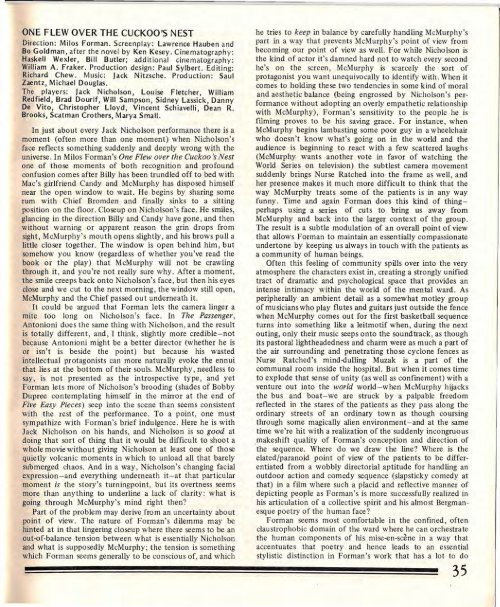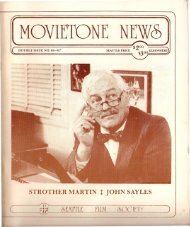MOVIETONE NEW8 . - Parallax View Annex
MOVIETONE NEW8 . - Parallax View Annex
MOVIETONE NEW8 . - Parallax View Annex
Create successful ePaper yourself
Turn your PDF publications into a flip-book with our unique Google optimized e-Paper software.
ONE FLEW OVER THE CUCKOO'S NEST<br />
Direction: Milos Forman. Screenplay: Lawrence Hauben and<br />
Bo Goldman, after the novel by Ken Kesey. Cinematography:<br />
Haskell Wexler, Bill Butler; additional cinematography:<br />
William A. Fraker. Production design: Paul Sylbert. Editing:<br />
Richard Chew. Music: Jack Nitzsche. Production: Saul<br />
Zaentz, Michael Douglas.<br />
The players: Jack Nicholson, Louise Fletcher, William<br />
Redfield, Brad Dourif, Will Sampson, Sidney Lassick, Danny<br />
De Vito, Christopher Lloyd, Vincent Schiavelli, Dean R.<br />
Brooks, Scatman Crothers, Marya Small.<br />
In just about every Jack Nicholson performance there is a<br />
moment (often more than one moment) when Nicholson's<br />
face reflects something suddenly and deeply wrong with the<br />
universe. In Milos Forman's One Flew over the Cuckoo's Nest<br />
one of those moments of both recognition and profound<br />
confusion comes after Billy has been trundled off to bed with<br />
Mac's 'girlfriend Candy and McMurphy has disposed himself<br />
near the open window to wait. He begins by sharing some<br />
rum with Chief Bromden and finally sinks to a sitting<br />
position on the floor. Closeup on Nicholson's face. He smiles,<br />
glancing in the direction Billy and Candy have gone, and then<br />
without warning or apparent reason the grin drops from<br />
sight, McMurphy's mouth opens slightly, and his brows pull a<br />
little closer together. The window is open behind him, but<br />
somehow you know (regardless of whether you've read the<br />
book or the play) that McMurphy will not be crawling<br />
through it, and you're not really sure why. After a moment,<br />
the smile creeps back onto Nicholson's face, but then his eyes<br />
close and we cut to the next morning, the window still open,<br />
McMurphy and the Chief passed out underneath it.<br />
lt could, be argued that Forman lets the camera linger a<br />
mite too long on Nicholson's face. In The Passenger,<br />
Antonioni does the same thing with Nicholson, and the result<br />
is totally different, and, I think, slightly more credible-not<br />
because Antonioni might be a better director (whether he is<br />
or isn't is beside the point) but because his wasted<br />
intellectual protagonists can more naturally evoke the ennui<br />
that lies at the bottom of their souls. McMurphy, needless to<br />
say, is not presented as the introspective type, and yet<br />
Forman lets more of Nicholson's brooding (shades of Bobby<br />
Dupree contemplating himself in the mirror at the end of<br />
Five Easy Pieces) seep into the scene than seems consistent<br />
with the rest of the performance. To a point, one must<br />
sympathize with Forman's brief indulgence. Here he is with<br />
Jack Nicholson on his hands, and Nicholson is so good at<br />
doing that sort of thing that it would be difficult to shoot a<br />
whole movie without giving Nicholson at least one of those<br />
quietly volcanic moments in which to unload all that barely<br />
submerged chaos. And in a way, Nicholson's changing facial<br />
expression-and everything underneath it-at that particular<br />
moment is the story's turningpoint, but its overtness seems<br />
more than anything to underline a lack of clarity: what is<br />
going through McMurphy's mind right then?<br />
Part of the problem may derive from an uncertainty about<br />
point of view. The nature of Forman's dilemma may be<br />
hinted at in that lingering closeup where there seems to be an<br />
out-of-balance tension between what is essentially Nicholson<br />
and what is supposedly McMurphy; the tension is something<br />
which Forman seems generally to be conscious of, and which<br />
he tries to keep in balance by carefully handling McMurphy's<br />
part in a way that prevents McMurphy's point of view from<br />
becoming our point of view as well. For while Nicholson is<br />
the kind of actor it's damned hard not to watch every second<br />
he's on the screen, McMurphy is scarcely the sort of<br />
protagonist you want unequivocally to identify with. When it<br />
comes to holding these two tendencies in some kind of moral<br />
and aesthetic balance (being engrossed by Nicholson's performance<br />
without adopting an overly empathetic relationship<br />
with McMurphy), Forman's sensitivity to the people he is<br />
filming proves to be his saving grace. For instance, when<br />
McMurphy begins lambasting some poor guy in a wheelchair<br />
who doesn't know what's going on in the world and the<br />
audience is beginning to react with a few scattered laughs<br />
(McMurphy wants another vote in favor of watching the<br />
World Series on television) the subtlest camera movement<br />
suddenly brings Nurse Ratched into the frame as well, and<br />
her presence makes it much more difficult to think that the<br />
way McMurphy treats some of the patients is in any way<br />
funny. Time and again Forman does this kind of thingperhaps<br />
using a series of cuts to bring us away from<br />
McMurphy and back into the larger context of the group.<br />
The result is a subtle modulation of an overall point of view<br />
that allows Forman to maintain an essentially compassionate<br />
undertone by keeping us always in touch with the patients as<br />
a community of human beings.<br />
Often this feeling of community spills over into the very<br />
atmosphere the characters exist in, creating a strongly unified<br />
tract of dramatic and psychological space that provides an<br />
intense intimacy within the world of the mental ward. As<br />
peripherally an ambient detail as a somewhat motley group<br />
of mu sicians who play flutes and guitars just outside the fence<br />
when McMurphy comes out for the first basketball sequence<br />
turns into something like a leitmotif when, during the next<br />
outing, only their music seeps onto the soundtrack, as though<br />
its pastorallightheadedness and charm were as much a part of<br />
the air surrounding and penetrating those cyclone fences as<br />
Nurse Ratched's mind-dulling Muzak is a part of the<br />
communal room insidethe hospital. But when it comes time<br />
to explode that sense of unity (as well as confinement) with a<br />
venture out into the world world-when McMurphy hijacks<br />
the bus and boat-we are struck by a palpable freedom<br />
reflected in the stares of the patients as they pass along the<br />
ordinary streets of an ordinary town as though coursing<br />
through some magically alien environment-and at the same<br />
time we're hit with a realization of the suddenly incongruous<br />
makeshift quality of Forman's conception and direction of<br />
the sequence. Where do we draw the line? Where is the<br />
elated/paranoid point of view of the patients to be differentiated<br />
from a wobbly directorial aptitude for handling an<br />
outdoor action and comedy sequence (slapsticky comedy at<br />
that) in a film where such a placid and reflective manner of<br />
depicting people as Forman's is more successfully realized in<br />
his articulation of a collective spirit and his almost Bergmanesque<br />
poetry of the human face?<br />
Forman seems most comfortable in the confined, often<br />
claustrophobic domain of the ward where he can orchestrate<br />
the human components of his mise-en-scene in a way that<br />
accentuates that poetry and hence leads to an essential<br />
stylistic distinction in Forman's work that has a lot to do<br />
35




